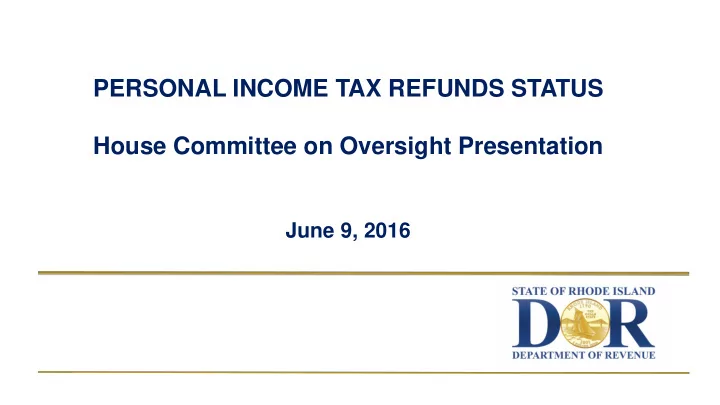

PERSONAL INCOME TAX REFUNDS STATUS House Committee on Oversight Presentation June 9, 2016
Agenda • Executive Summary • Division of Taxation Status • Refund Fraud • STAARS Project • Process Changes and Staffing • Delay Factors • Refund Delays in Other States • Tax Season Comparison 2015 vs. 2016 • Timeline for Substantial Completion • Action Plan • Future State 2
Executive Summary • The Division of Taxation has processed ~395,000 refunds as of 6/6/16 (95% of progress last year). • Potentially Fraudulent tax refunds have increased by 84% since 2015. • Delay factors: Increased fraud experience Auditor General review mandate STAARS rollout Filing Errors Staffing challenges due to increased calls/walk-ins/emails • Substantively all valid tax refunds filed as of 6/6/2016 should be issued by mid-July 2016. • Safeguarding Taxpayer information and money is primary objective. 3
Division of Taxation Status • Total Employee Count: 225 • Employees in Personal Income Tax Section : 23 • Employees in Tax Processing Section: 21 FT; 12 Seasonal • 2.5 Million Filings (total) • 58 Different Taxes and Fees • 2015 FY Revenue: $3.2 Billion • 2016 YTD Revenue: $2.8 Billion • YTD Income tax returns filed: 562,916 • YTD Income tax refunds filed: 393,629 4
Refund Fraud • At the national level, the IRS is taking three times longer to process refunds in 2016 due to fraud with an estimated loss of $21 billion due to identity theft. • The IRS identified 42,000 fraudulent tax returns amounting to $227 million in the first 1.5 months of this tax season and confirmed blocking $7 billion in fraudulent returns last year. • At the state level, multiple states have delayed processing of refunds. • New RI tax technology allows for advanced fraud analytics . • The DOR’s primary objective is to safeguard taxpayer information and to ensure taxpayer refunds are accurate and valid . 5
STAARS Project • $25 million new RI tax system implementation (“STAARS”) approved and launched in 2013. • Phases 1.0, 1.5 and 2.0 on time and on budget. Shifts RI from manual paper batching and manual data entry to scanning, data capture , & data verification Automates 36 miscellaneous tax streams, IFTA, Personal Income Tax, Collections and Initial Revenue Accounting • Final Release 3.0 launches 10/16 and concludes 6/17. Includes Online Taxpayer Portal, online Letters of Good Standing, and automation of another 22 different tax streams 6
Process Changes and Staffing • Current tax staff is working through a live implementation of the first personal income tax season with new STAARS system and preparing for the final phase of STAARS in FY 2017. • Staff directly involved with testing and received training prior to implementation. • New cyber-fraud context requires constant real-time response to fraud information shared between federal and state agencies, vendors, stakeholders, and the public. • New technology shifts from manual data entry to state of the art scanning/data capture and limited key entry. • 100% audit review (above minimum thresholds) is demanding. 7
Delay Factors “There has been a 400 percent increase in email phishing and malware incidents this tax season aimed at both taxpayers and tax professionals.” --Accounting Today, citing the IRS, February 18, 2016 • Suspected Refund Fraud • Auditor General Mandate • Tax Form Supplier Noncompliance • New System Transition • Staffing Challenges • Taxpayer Error 8
Refund Delays in Other States “All states with an individual income tax are experiencing refund delays due to high levels of refund fraud this tax season.” -- State Tax Today, citing Federation of Tax Administrators, March 14, 2016 State Delay Length Reason Hawaii 16 weeks Additional Safeguards Colorado 8-10 weeks Fraud Idaho 7-11 weeks Fraud and/or Entry Errors Louisiana 8-14 weeks Fraud Virginia 2-8 weeks Fraud and/or Entry Errors West Virginia 2-3 weeks Enhanced Security Measures Missouri 10 weeks Fraud Georgia 6-8 weeks Fraud Vermont 10 days-4 weeks Fraud Michigan 2-3 weeks after ID quiz Fraud Maryland General Delay-Not Specified Fraud and/or Entry Errors 9
Tax Season Comparisons 2015 vs. 2016 2015 2016 Total Tax Year Refunds Issued* 454,214 446,000 Total YTD Refunds Issued (6/6) 415,985 393,629 YTD % of Total Tax Year Refunds Issued * 92% 88% YTD Refunds Issued % of Prior YTD (6/6) 100% 95% Fraud 25,522 12,758 User Error 17,332 14,395 Remaining to Work in Queues (6/6) Refund Confirms N/A 2,297 2,349 14,066 Scanning/Paper Refunds Remaining in Queues (6/6) 29,502 59,217 Refunds Under Long Term Evaluation** (13,952) (13,952) Net Refunds Remaining 15,550 45,265 *2016 Total Tax Year estimated using prior year statistical data. **End of tax year number 10
Timeline for Substantial Completion • Based on the tax returns filed as of 6/6/2016: 59,217 refunds remain in the queues; it is estimated that 13,952* will remain under long- term evaluation at year-end. • Therefore it is estimated that 45,265** refunds are expected to actually be issued in the short-term. • Assuming 6,000 refunds are processed per week, we should reach completion by mid-July . *Estimation based on tax year 2014 year-end data **Estimation based on statistical analysis of previous three tax years 11
Action Plan • Redeployed refund processing staff from Field Audit and Collections to Personal Income Tax and Tax Processing to cover surge in demand. • Implementing select audit filters and intelligent reductions real- time to further reduce queues . • Increased third-party staff from RSI and Fairfax (scanning) vendors. • Keeping taxpayers informed by addressing media with full transparency and regular web updates. • Full staffing expected to largely clear refund queue . 12
Future State: 2017 • Capturing “lessons learned” and modifying procedures accordingly. • Assessing online portal benefits and increased productivity in STAARS 3.0. • Addressing peak staffing requirements and organizational caliber by adding FTE’s in 2017. • Expanding cyber fraud “unit” to streamline process and further protect taxpayers. • Have provided legislation to move W-2 filing to January 31 to enhance earlier fraud detection in 2017. • Expanding LEAN processes beyond Letters of Good Standing to other processes. 13
Recommend
More recommend